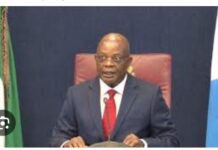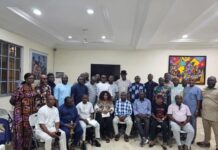Wike’s Defiant Stand: A Battle for Political Supremacy
Nyesom Wike is no stranger to political battles. His tenure as Rivers State Governor was marked by a series of confrontations with political adversaries, both within and outside his party. However, his latest outburst against PDP governors who he accuses of meddling in Rivers State’s party affairs represents a new chapter in his political journey—one that could have far-reaching consequences.
Speaking at the PDP secretariat in Port Harcourt during the state congress, Wike’s words were laced with a mix of defiance and threat: “Let me assure all of you, not while we live will anybody take away the structure of the PDP from us. But let me tell people, I hear some governors who say they will take over the structure and give back to somebody. I pity those governors because I will put fire in their states.”
Wike’s warning is not an idle threat. His track record of political manoeuvring suggests that he is willing to go to great lengths to protect his interests in Rivers State. The reference to putting “fire in their states” is a chilling reminder of the political chaos that could ensue if these tensions are not managed.
The PDP Governors’ Forum: A House Divided?
The PDP Governors’ Forum, under the chairmanship of Bauchi State Governor Bala Mohammed, recently convened in Taraba State to address the growing crisis within the party in Rivers State. The Forum’s decision to review the outcome of the party congress in Rivers, with the aim of restoring Governor Siminalayi Fubara’s leadership role, was seen by many as an attempt to curb Wike’s influence.
However, Wike’s swift and forceful response to this move has exposed deep divisions within the PDP. His public rebuke of the Forum’s intervention raises questions about the unity and cohesion of the PDP governors, who are supposed to be the custodians of the party’s collective interest. Instead, the Forum’s actions have been perceived as an affront to Wike’s political authority, triggering a confrontation that could have dire consequences for the party’s future.
Siminalayi Fubara: Caught in the Crossfire
Governor Siminalayi Fubara, the man at the centre of this crisis, finds himself in an unenviable position. As Wike’s successor in Rivers State, Fubara has inherited not just the governance of the state but also the political baggage that comes with it. The fallout between Wike and Fubara has turned what should have been a smooth transition of power into a bitter struggle for control of the PDP’s machinery in the state.
Fubara’s absence from the PDP state congress, which Wike attended, speaks volumes about the rift between the two men. The fact that Wike’s allies dominated the congress further underscores the extent to which Wike still holds sway over the party in Rivers State. For Fubara, the challenge now is not just to govern effectively but to navigate the treacherous waters of Rivers State politics without alienating the man who played a crucial role in his rise to power.
The South-South Factor: A Region on Edge
The South-South region, with its rich oil reserves and strategic importance, has always been a key battleground in Nigerian politics. The current crisis in Rivers State threatens to destabilise not just the PDP but also the broader political landscape in the region.
Wike’s threat to “put fire” in the states of any governor who interferes in Rivers is a clear indication that the South-South could become a theatre of political conflict in the coming months. The prospect of a protracted power struggle between Wike and other PDP governors could lead to a breakdown of law and order, with dire implications for governance and development in the region.
Moreover, Wike’s reference to a “signature bonus” as the reason for the governors’ interference hints at the financial underpinnings of this crisis. The allocation of resources in the South-South, particularly in relation to oil revenue, has always been a contentious issue. If Wike’s accusations are true, then the battle for control of the PDP in Rivers State is not just about political power but also about access to the region’s wealth.
The National Implications: A Test for PDP’s Leadership
The crisis in Rivers State is not just a regional issue; it is a test for the leadership of the PDP at the national level. The party, which once held sway over the entire country, has been struggling to regain its footing since losing the presidency in 2015. The ongoing power struggle in Rivers State, if not resolved, could further weaken the party’s chances of staging a comeback in future elections.
The PDP’s national leadership now faces a delicate balancing act. On one hand, they must assert their authority and ensure that the party remains united. On the other hand, they must avoid alienating Wike, who remains one of the party’s most influential figures. How the party navigates this crisis will determine its prospects in the 2027 general elections.
Furthermore, the crisis in Rivers State could have a ripple effect on other states where the PDP is in power. If Wike follows through on his threat to instigate political crises in the states of his rivals, it could lead to a wave of instability that would be difficult to contain. The party’s ability to manage internal conflicts will be crucial in the months ahead.
Wike’s Legacy: A Double-Edged Sword
Nyesom Wike’s legacy as a political leader is a double-edged sword. On one hand, he is credited with transforming Rivers State during his tenure as governor, particularly in terms of infrastructure development. On the other hand, his abrasive style and penchant for confrontation have made him a polarising figure.
Wike’s current battle to maintain control of the PDP in Rivers State is a continuation of his long-standing strategy of using political power as both a shield and a weapon. However, this approach carries significant risks. By threatening to destabilise other states, Wike is playing a high-stakes game that could backfire.
If Wike succeeds in his quest to retain control of the PDP in Rivers State, it will reinforce his reputation as a master strategist and a formidable force in Nigerian politics. However, if his actions lead to widespread chaos and instability, it could tarnish his legacy and weaken his influence in the long run.
The Road Ahead: What’s at Stake?
As the crisis in Rivers State continues to unfold, the stakes could not be higher. For Wike, the battle to retain control of the PDP in his home state is about more than just political survival; it is about securing his legacy and maintaining his relevance in the national political arena.
For the PDP, the outcome of this crisis will have far-reaching implications for its future as a major political force in Nigeria. The party’s ability to resolve internal conflicts and present a united front will be critical in determining its prospects in the 2027 elections.
For the South-South region, the crisis in Rivers State is a reminder of the fragile nature of political stability in a region that has long been a hotbed of conflict and unrest. The prospect of a renewed power struggle in the region raises concerns about the potential for violence and the impact on governance and development.
Nyesom Wike’s latest outburst against PDP governors who he accuses of meddling in Rivers State’s party affairs is a stark reminder of the volatile nature of Nigerian politics. As the crisis in Rivers State unfolds, the coming months will be crucial in determining the future of the PDP, the South-South region, and Nigeria’s broader political landscape.
Wike’s threats to ignite political crises in the states of his rivals should not be taken lightly. The potential for instability is real, and the consequences could be dire. It is now up to the PDP’s leadership to step in and resolve this crisis before it spirals out of control.
The stakes are high, and the outcome of this power struggle will have a profound impact on the future of Nigeria’s political landscape. The nation watches with bated breath as the drama in Rivers State continues to unfold.
Share this:











